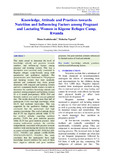| dc.contributor.author | Iradukunda, D | |
| dc.contributor.author | Ngomi, Nicholas N. | |
| dc.date.accessioned | 2021-03-24T12:38:11Z | |
| dc.date.available | 2021-03-24T12:38:11Z | |
| dc.date.issued | 2020-06 | |
| dc.identifier.citation | Galore International Journal of Health Sciences and Research Vol.5; Issue: 2; April-June 2020 | en_US |
| dc.identifier.issn | 2456-9321 | |
| dc.identifier.uri | https://www.gijhsr.com/GIJHSR_Vol.5_Issue.2_April2020/17.pdf | |
| dc.identifier.uri | https://www.semanticscholar.org/paper/Knowledge%2C-Attitude-and-Practices-towards-Nutrition-Iradukunda-Ngomi/eee5e1b672e08f2a48aa05407abab450aebe0dab | |
| dc.identifier.uri | http://hdl.handle.net/123456789/4559 | |
| dc.description.abstract | This study aimed to determine the level of knowledge, attitude and practices towards nutrition and influencing factors among pregnant and lactating women. This was a descriptive cross-sectional study conducted in Kigeme refugee camp-Rwanda using both quantitative and qualitative methods. The questionnaires were distributed to 220 pregnant and lactating women that were randomly selected and conducted four focus groups discussion with pregnant and lactating women and to14 community health workers in order to determine the nutrition knowledge attitude and practices among pregnant and lactating women (0 to 6 month post-partum). SPSS 20.0 and thematic analysis was used to analyze gathered data. The results showed that more than half of participants 53.6% had high knowledge, while 46.4% had moderate knowledge. This was supported by the qualitative findings which confirmed that the participants had high nutrition knowledge. The level of attitude show that 67.2% has negative attitude while 32.7% has positive attitude; regarding nutrition practice, 71.8% had poor nutrition practice while 28.2% had good nutrition practice. After running multivariate analysis, the variables independently associated with practice towards nutrition were purchasing the food in the market as source of food (AOR=14.987; 95%CI=1.650-4.231; P=0.001) and attitude (AOR=18.896; 95%CI=2.674-10.537; P<0.001). The study concludes that the participants have high knowledge toward nutrition but most of them have negative attitude and poor nutrition practices. The poor nutrition attitudes influenced by limited source of food and attitude. | en_US |
| dc.language.iso | en | en_US |
| dc.subject | knowledge, attitude, practices, nutrition and influencing factors. | en_US |
| dc.title | Knowledge, Attitude and Practices towards Nutrition and Influencing Factors among Pregnant and Lactating Women in Kigeme Refugee Camp, Rwanda | en_US |
| dc.type | Article | en_US |

